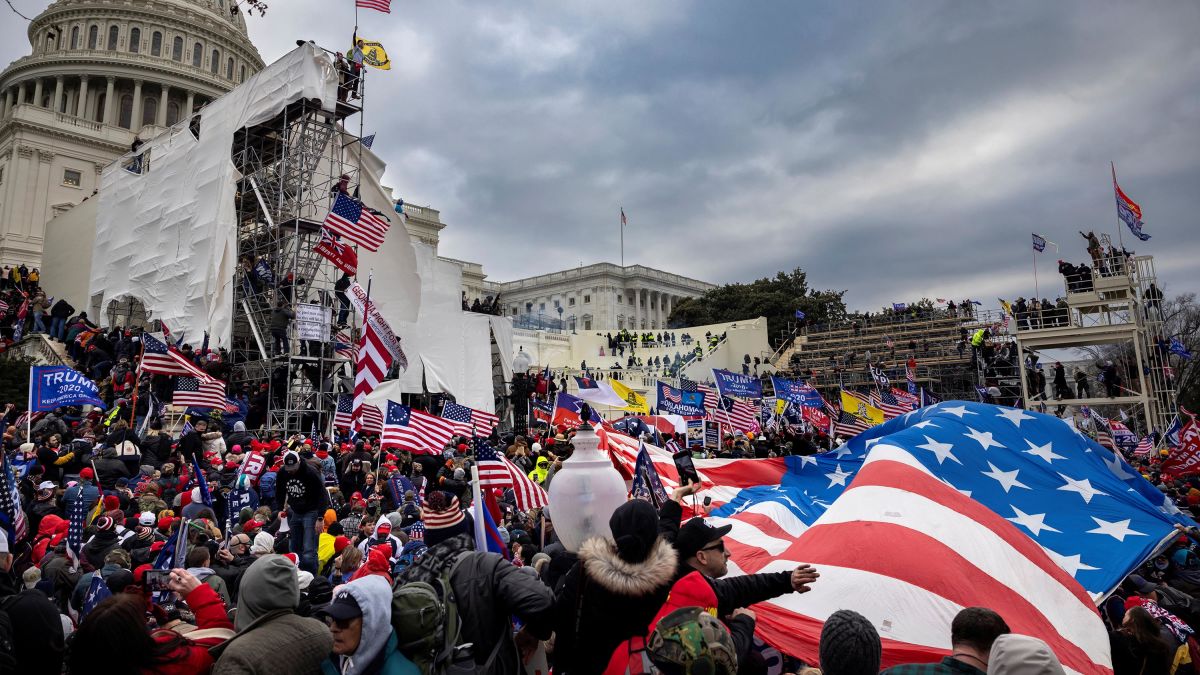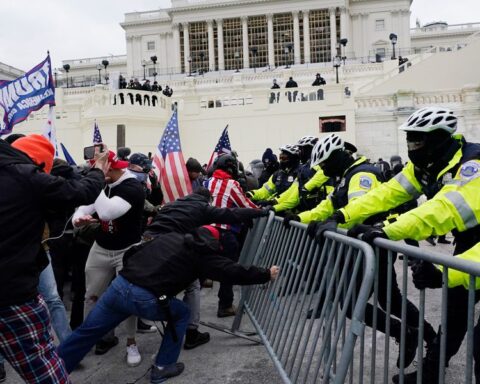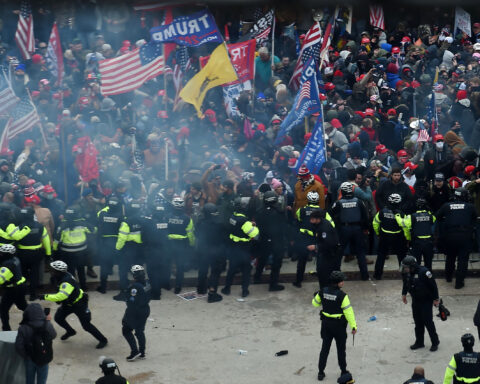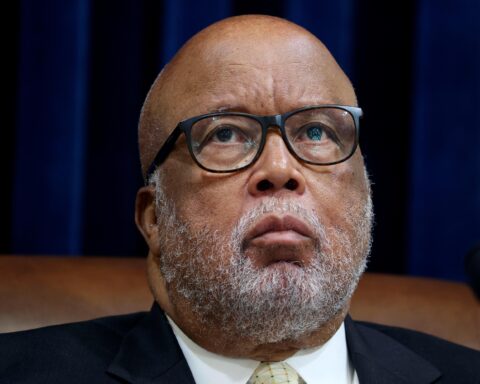If January 6, 2021, was just one infamous day in history, its stain on the American story would still reverberate through generations.
But the US Capitol insurrection was far from a self-contained day of rage. It was both the culmination of the rule of an aberrant, demagogic President and a catalyst for the most enduring onslaught on America’s system of elective governance in decades. It legitimized violence as a tool of political expression among millions of citizens and cast the haunting possibility that as horrific as that day was, it may be only a preview of a deeper democratic rupture to come.
The aftermath of hours of terror ignited by Donald Trump inciting a mob to “fight like hell” to deny the will of voters revealed that large chunks of the Republican Party had rejected the principle of an expansive, unified democracy for which its first President, Abraham Lincoln, had died. Far from destroying the mythology of Trumpism, Republicans clambered onto the metaphorical wreckage in the Capitol to launch a nationwide voter-suppression scheme that could make it easier to steal future elections without the need for a baying mob to storm the Capitol.
A year on, the assault on Congress that interrupted nearly two-and-a-half centuries of peaceful transfers of power is one of those dates whose notoriety allows it to stand alone. If September 11, 2001, was the day that destroyed an age-old illusion underpinning US power — that the mainland was immune to outside attack — January 6 brought an epiphany that democracy may not actually be forever. It revealed that the authoritarian forces that preoccupied the founders, and that have simmered below American civil society ever since, are unleashed.
“We came perilously close to losing our democracy,” Rep. Bennie Thompson, the Mississippi Democrat heading the House committee probing the insurrection, told CNN.
A still-shocking turn of events
So much misinformation and propaganda have been spewed by Trump, his Republican henchmen and conservative media that it’s worth dwelling on what actually unfolded before the eyes of the world. The House panel, which offers the best chance of a historic record of that day, seems to be getting ever closer to uncovering what happened behind the scenes in the White House. But it began with a President whose explosive ego and scorn for constitutional guarantees made it impossible for him to admit defeat and who falsely claimed victory in the 2020 election.
But weeks of lies, evidence-free cases laughed out of court and attempts to coerce local leaders to cheat him to a second term failed. At the time, most people didn’t know about a crazed ploy to subvert the Electoral College that Trump hoped to use to convince then-Vice President Mike Pence to throw him the election in Congress.
When all else had failed, Trump summoned supporters to a Washington rally he primed with extremist voter fraud fantasies, on the very day that Congress, under Pence’s jurisdiction, was due to certify Joe Biden’s 2020 election victory.
“If you don’t fight like hell, you’re not going to have a country anymore,” he told a crowd whipped into a frenzy by his venom. “We’re going to try and give our Republicans … the kind of pride and boldness that they need to take back our country. So let’s walk down Pennsylvania Avenue.”
Of course, Trump did not put himself in harm’s way. He retreated to the safety of the White House to watch the mayhem unfold on television as his invaders swarmed the platform awaiting Biden’s inauguration later that month and smashed down doors and windows in one of the vilest scenes ever witnessed beneath the Capitol dome.
For three hours, according to new evidence from the January 6 committee, Trump refused to call off a violent crowd that beat police officers, demanded the hanging of Pence, sent lawmakers running for their lives and defiled the symbols of democratic government in the House and the Senate. If not for heroes of law enforcement, some of the country’s most senior elected leaders might have perished. As it was, the violence led to four deaths, including Trump supporter Ashli Babbitt, shot by a Capitol Police officer as she tried to invade the Speaker’s Lobby, after she had been drawn to Washington by her leader’s lies.
Even a year on, it’s hard to believe that this all happened in the United States, for so long a democratic beacon for the world.
For any other American president, in any other time, such a dereliction of duty in failing to defend the US government from attack would have meant immediate political oblivion. The reality that Trump may be an even more powerful figure in the GOP now is the story of the year since January 6.
The GOP’s ambition and self-preservation
When Minority Leader Kevin McCarthy rose in the House a few days later to say the then-President “bears responsibility for Wednesday’s attack on Congress by mob rioters,” it seemed for a fleeting moment that the Republican Party would finally tear itself free from Trump’s thrall.
Yet three weeks after the riot, the California Republican turned up at Mar-a-Lago, Trump’s Florida retreat, grinning into a camera alongside the insurrectionist in chief. His visit rehabilitated the disgraced ex-President as a political force and effectively put his party’s hopes of winning back the House this November in his hands.
McCarthy wasn’t the only senior Republican to renounce his heresy on the road to the midterms. Trump’s golf buddy, Republican Sen. Lindsey Graham of South Carolina, said of Trump’s election-stealing attempt: “Enough is enough” and “you can count me out.” But a year on, he’s Trump’s cheerleader again. And in the Senate, all but seven Republicans voted to acquit Trump over the riot in his second impeachment trial, when a conviction would have likely barred him from future federal office. Some argued that as an ex-President he could no longer do any damage — a position of great naivete or, more likely, political calculation.
The GOP’s continuing fealty to Trump despite the horror of January 6 is the act of a party driven by “an instinct for self-preservation and self-advancement (that) worked itself into a campaign to normalize and excuse the insurrection,” said John Mark Hansen, a professor of political science at the University of Chicago. Or as Graham put it about Trump, “If you try to drive him out of the Republican Party, half the people will leave.”
Even stripped of his social media megaphone, Trump’s power over his supporters is almost supernatural and is sustained by an industry of lie-mongering conservative media that has rewritten the history of January 6 for its viewers. While the GOP’s shielding of Trump has kept his impunity intact, the foot soldiers of his coup bid at the Capitol are starting to get jail terms.
Only 27% of Republicans in a recent Washington Post/University of Maryland poll said Trump bears a “great deal” or a “good amount” of blame for January 6. In the same poll, 69% of Trump voters said Biden was not legitimately elected in 2020 — the lie at the heart of the insurrection. Amplifying that falsehood is the price of entry for 2022 GOP candidates who want the former President’s support. And it may yet power a Trump 2024 presidential bid. Such misinformation ultimately threatens democracy itself, since many Trump supporters now believe that elections are inherently corrupt and any Democratic win is illegitimate.
Ruth Ben-Ghiat, a professor of history and author of “Strongmen,” a book about heads of state who destroy or damage democracy, said the insurrection would have been impossible without Trump’s personality cult.
“The whole big lie was extraordinary. It was an authoritarian leader operation to keep him in power,” Ben-Ghiat said. “But what is amazing is everybody is going along with it. Millions of people now believe this. And he’s made the party into a personal tool.”
Given Trump’s instincts and record, he’s unlikely to use that power for the national interest.
An electoral system under assault
One of the most widely shared sentiments outside Trump’s support base after the attack was quelled was that the system worked.
Lawmakers returned to the Capitol hours after it had been breached and, even with the majority of House Republicans voting to overturn the election, Congress certified Biden’s win. With Trump already sulking in Florida, a new President took office on January 20, declaring that “the will of the people has been heard and the will of the people has been heeded.”
State Republicans who refused Trump’s entreaties to steal the election, like Georgia Secretary of State Brad Raffensperger, were lionized by liberals. The Republican members of the January 6 committee — Vice Chair Liz Cheney of Wyoming and Rep. Adam Kinzinger of Illinois — are in the process of sacrificing their careers to protect the truth and the Constitution. The most meaningful divide in American politics is no longer between left and right but between those who uphold democracy and those who desecrate it.
But in the aftermath of January 6, the GOP did not look inward and examine why Trump had lost, or how the unthinkable had happened. Trump supporters set about reverse-engineering the system that had saved democracy to make it more pliable to his autocracy in the future. Republican legislatures, including in key swing states, were soon passing bills that made it harder to vote, especially for Democrats and minorities.
Some are mulling giving themselves the power to appoint Electoral College slates that defy the will of voters. Others are replacing nonpartisan election workers with political hacks. Trump is backing 2020 election deniers for key jobs running elections in states like Georgia and Michigan. Republicans in Arizona mounted a sham vote audit in a state critical to Biden’s victory, then misrepresented the result when it confirmed the original outcome. And in Michigan, Republicans are using a quirk in the state Constitution to employ a ballot initiative that needs just over 340,000 signatures to try to force through electoral law changes vetoed by a Democratic governor who won with more than 2.2 million votes in 2018.
“There are extremists in Michigan. What we’re seeing here in this state is on a micro level exactly what is happening in the rest of the country,” said Nancy Wang, executive director of Voters not Politicians, a pro-democracy group.
All of this is under the false guise of “election integrity” rooted in Trump’s lies that one of the most secure elections in US history was irrevocably corrupt.
“It’s the most bald-faced attempt at disenfranchisement since Jim Crow,” said Hansen, the University of Chicago professor.
According to the Brennan Center for Justice, 19 states passed 34 laws restricting access to voting between January and December 7, 2021. At least 13 additional bills had been prefiled in state legislatures for 2022. And at least 88 restrictive voting bills in nine states will carry over from last year. In Georgia, one of the most closely fought states in 2020, a new law allows the state’s politicized election board to remove professional election officials and seize control of specific jurisdictions. Other states are shortening voting hours and reducing mail-in voting that broadens the franchise.
“We’ve seen a multipronged attack on the foundations of our democracy and electoral system. And it includes the largest-scale legislative attack on voting rights in a century,” said Wendy Weiser, Brennan’s vice president for democracy.
Democrats in Congress charge that the voter suppression push is a scheme to cement minority power by a party that has won the popular vote in only one of the last eight presidential elections.
“If we do not act to protect our elections, the horrors of January 6 will risk becoming not the exception but the norm,” Senate Majority Leader Chuck Schumer said this week. The New York Democrat is seeking to use the symbolism of the January 6 anniversary to highlight the Freedom to Vote Act and the John Lewis Voting Rights Advancement Act, which would reverse many of the new state restrictions on voting. But he must first persuade two skeptical Democratic senators, West Virginia’s Joe Manchin and Arizona’s Kyrsten Sinema, to ditch the filibuster in order to get them passed.
Senate Minority Leader Mitch McConnell, a Kentucky Republican, is turning the argument on its head, saying the claim that Republican-led states are messing with the franchise is the real “big lie.” But his party seems dedicated to the principle of making sure fewer people vote in elections.
It’s not a given that Trump would need to steal another election in 2024, especially if Biden’s political fortunes don’t improve or voters sour on a President who ran as a moderate and who some think is now engaged in massive liberal overreach. Perhaps enough local officials might again stand up for democracy in the decisive moment. And a huge turnout from Americans determined to exercise their democratic right could thwart voter suppression.
But one year on, the lesson of January 6 is that what was once thought impossible can happen. And the threat to American democracy is greater now than it was when Trump turned his mob on the Constitution.







